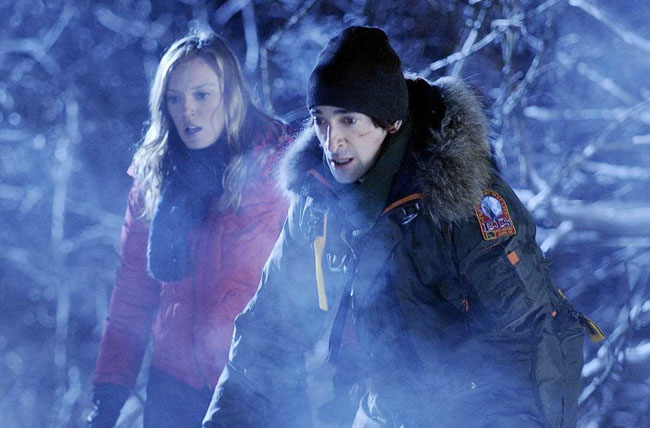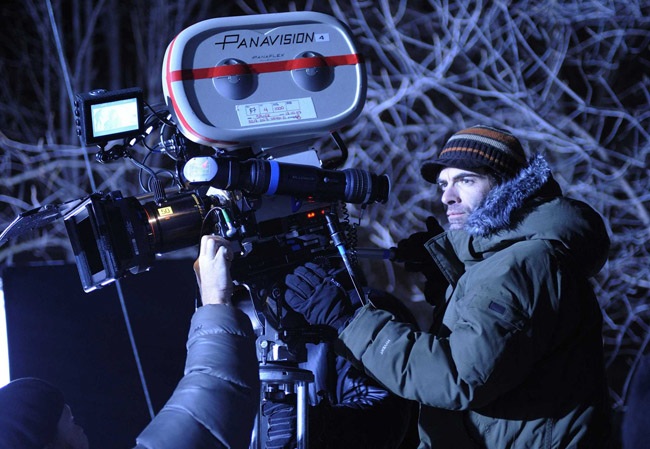CHICAGO – Patrick McDonald of HollywoodChicago.com appears on “The Morning Mess” with Dan Baker on WBGR-FM (Monroe, Wisconsin) on March 21st, 2024, reviewing the new streaming series “Manhunt” – based on the bestseller by James L. Swanson – currently streaming on Apple TV+.
Interview: Director Vincenzo Natali Dissects His New Film ‘Splice’
CHICAGO – The universe is sometimes blinded by science, and director Vincenza Natali explores that sightlessness in the upcoming “Splice,” a sci-fi thriller featuring Adrien Brody and Sarah Polley as rogue scientists trying to unlock the mysteries of life with experiments in human and animal gene splicing.
Vincenzo Natali started his career in animation, working as a storyboard artist on several TV cartoons, and occasionally doing storyboarding for movies. His breakthrough came with the Canadian backed film “Cube” in 1997, which was highly regarded and very popular in Japan and France. After three more features, he also got to direct a segment in “Paris, je t’aime” in 2005.
Splice is modern science gone awry, as two experimental scientists (Adrien Brody and Sarah Polley) begin to “splice” the genetic codes between species, adding a secret experiment with human beings.
 Photo credit: Steve Wilkie for © Warner Bros. Pictures |
HolllywoodChicago.com sat down with the director of Splice, Vincenzo Natali, to explore the science fiction behind the factual issues in the film.
HollywoodChicago.com: This is a science fiction film based somewhat on the modern science of the gene research of today. What human or scientific flaw in messing with the genome are you attempting to expose through this story?
Vincenzo Natali: I think it’s just inherent in human nature to make mistakes. We see examples in all arenas – scientific, film and otherwise – but this is just one more. But in no way in this movie did I really want to overtly condemn what Clive and Elsa [the Brody and Polley characters] were doing. I personally believe that this kind of research is essential and I’m all for stem cell research. I side with Clive and Elsa in that I think that genetically we’ve been predisposed or designed to mess with our DNA. That is kind of fated to be. So it’s really not the Promethian Myth, it’s not about stealing fire, it’s about what we should do with the fire now that we have it.
In the case of Splice, where things do go wrong, it has everything to do with the fact that Clive and Elsa are just not mature enough to deal with the power and forces that they are playing with – they have a complete knowledge and understanding of the chemical building blocks of life, but they don’t understand life in its true essence.
HC: What was the the decision-making behind the look and design of the humanoid Dren?
VN: The prime directive was make her real, for no other reason that this is almost not a science fiction film. In the time it took me to write the script, the science has caught up with my fiction. And as we were shooting the film, they have legalized the creation of animal/human hybrids in the United Kingdom. In a sense there was no reason to be too fantastical with our creature design. I wanted to make her as biologically plausible as I could, and in many ways be real subtle in the way we engineered her. The feeling is that small changes to the human form would be more shocking than big ones.
Dren is the child of many parents, I had an incredible team of artists and technicians who made her real, and of course, Delphine Chanéac, the French actress who plays her.
HC: There is a distinct indication in this film that without commerce there would be no science. Is the drive for profits in the funding for the type of research depicted part of the evil that would eventually create a Dren?
VN: My emotional entry into Clive and Elsa was to see them kind of like an indie band or independent filmmakers as scientists. The cost of this work and the equipment isn’t all that prohibitive, a lot of what is used in a genetics lab you can find in your kitchen. It’s like cooking.
So the notion was that Clive and Elsa have their boutique laboratory, and then they’ve been absorbed in the larger pharmaceutical company. And a pharmaceutical company really doesn’t have a moral point of view. Which in my mind is the banality of evil. They aren’t thinking about what is right or wrong, they’re just thinking about the bottom line. And in this particular case, the bottom line prohibits the creation of an animal/human hybrid. So Clive and Elsa do it on their own.
Where I think that corporate culture could effect this sort of work in a negative way, in a way I find disturbing, is in the commodification of life forms. As I understand it, certain parts of the human genome is being patented. Something just seems inherently wrong about that, and that’s actually that aspect of all of this business that I find the most frightening.
 Photo credit: Steve Wilkie for © Warner Bros. Pictures |
HC: The sexual act is used somewhat aggressively in this story. Were you making a statement about sex as a biological imperative, because in Dren’s “adolescence” it overwhelms any civilizing or gender morality regarding the act itself?
VN: Yeah, Dren wants to reproduce. That is why there is sex in this movie. If you make something like Dren, and it lives long enough, you’re going to have to deal with that issue. And you’re also going to have to deal with your own responses as a human being. One the of things that was intriguing about this whole concept was that the idea of falling in love or being sexually drawn to something that is not human goes back to ancient myth, it’s been with us for thousands of years.
It doesn’t seem unreasonable to me that Clive would be drawn to Dren. I can certainly guess in a number of ways why that might be, I almost wonder if these concepts haven’t been implanted in us as part of our evolution, we’re going to make them come true. They are kind of signposts for where we’re heading in the future, and maybe even part of Clive’s attraction to Dren is to reproduce with something that is a step up on the evolutionary chain.
HC: Adrien Brody’s character gives in his temptations regarding sex while Sarah Polley’s character is taken in an act of violation. Is this another statement regarding genders and the power of sexuality in men versus women?
VN: First of all, Clive acts like a typical man. And with Sarah’s character Elsa, it’s a mother/daughter story, and it’s echoed in the hinted-at relationship that Elsa had with her own mother. And while the film establishes a family paradigm at first, it morphs into this weird love triangle. Because Elsa finds herself being jealous of the feelings that Dren has for Clive. Consciously or unconsciously she punishes Dren. This is not atypical for women either. In my mind, Dren was going to be a catalyst for bringing out the ‘monster’ within the scientists. And in a sense, she’s not a monster at all, she is as human if not more human than the humans around her are.
HC: The outcome and situation in Splice was reminiscent of Mary Shelley’s ‘Frankenstein.’ Why do you think humans is often cursed by their use of science that is counter to the organic solutions that flows out of nature?
VN: I think it is natural for humans to act unnaturally. I think we have to go with it. We’re never going to be like other animals. As long as it has a degree of balance.
Photo credit: Patrick McDonald for HollywoodChicago.com |
HC: Have you read or re-read Frankenstein recently?
VN: I have to confess that I read it last year because I knew I’d be interviewed and I’d better know it. [laughs]
HC: Absent from the film is a discussion of God or a higher power. Does truth and discovery in science drain the actuality of man to create a god to explain natural phenomenon or does it point toward the notion that a higher power does exist?
VN: For me it does, and I’m not religious. When I was doing research for the film, I saw a pig fetus in a very early stage, it had no blood but it had a heart, and the heart was beating. It really struck me, it was one of the most raw displays of life or the lifeforce that I had ever seen. I felt the force of it, that it wanted to exist. To me that has pseudo-spiritual/religious implications. Because you can’t imagine how something like that happens by accident or randomly.
HC: Themes of science versus nature were explored in your cult film ‘Cube’ as well. How does Splice relate to Cube and how does the situations in Splice become a natural extension of the dilemmas in Cube?
VN: I will point out the difference first. The difference between Cube and Splice, and why I hope Splice is an evolution from Cube, is that in Cube the characters are thrust into a situation that they weren’t a part of. In Splice, the situation and dilemma comes from the characters. The ones who are responsible for what happens in the film.
I don’t think about this stuff while I’m working on it but I think the movies are related, because in some sort of way they are an honest reaction to the world we live in now. My reaction is a common one – we are living in an interesting, frightening and exciting time.
HC: Finally, how does our humanity or morality help to keep a check on our intellectual evolution, especially when it comes to science and the related quest for profits?
VN: We learn by making mistakes, and as some of the forces we deal with – nuclear energy for example – become greater and greater those mistakes can be costlier, to a point where we might not survive the next mistake.
I see the two currents in the world, with positive things going on and not so good things going on. I have no idea where were going to land. But I think we’re on the cusp of something, it feels like there’s some big seismic shift going on in the world. And I can see that eventually landing in a good place, but not without a lot of pain first.
 | By PATRICK McDONALD |


